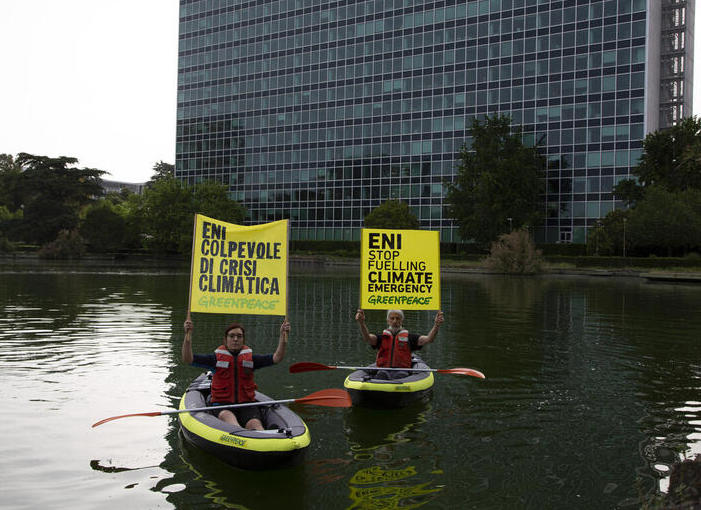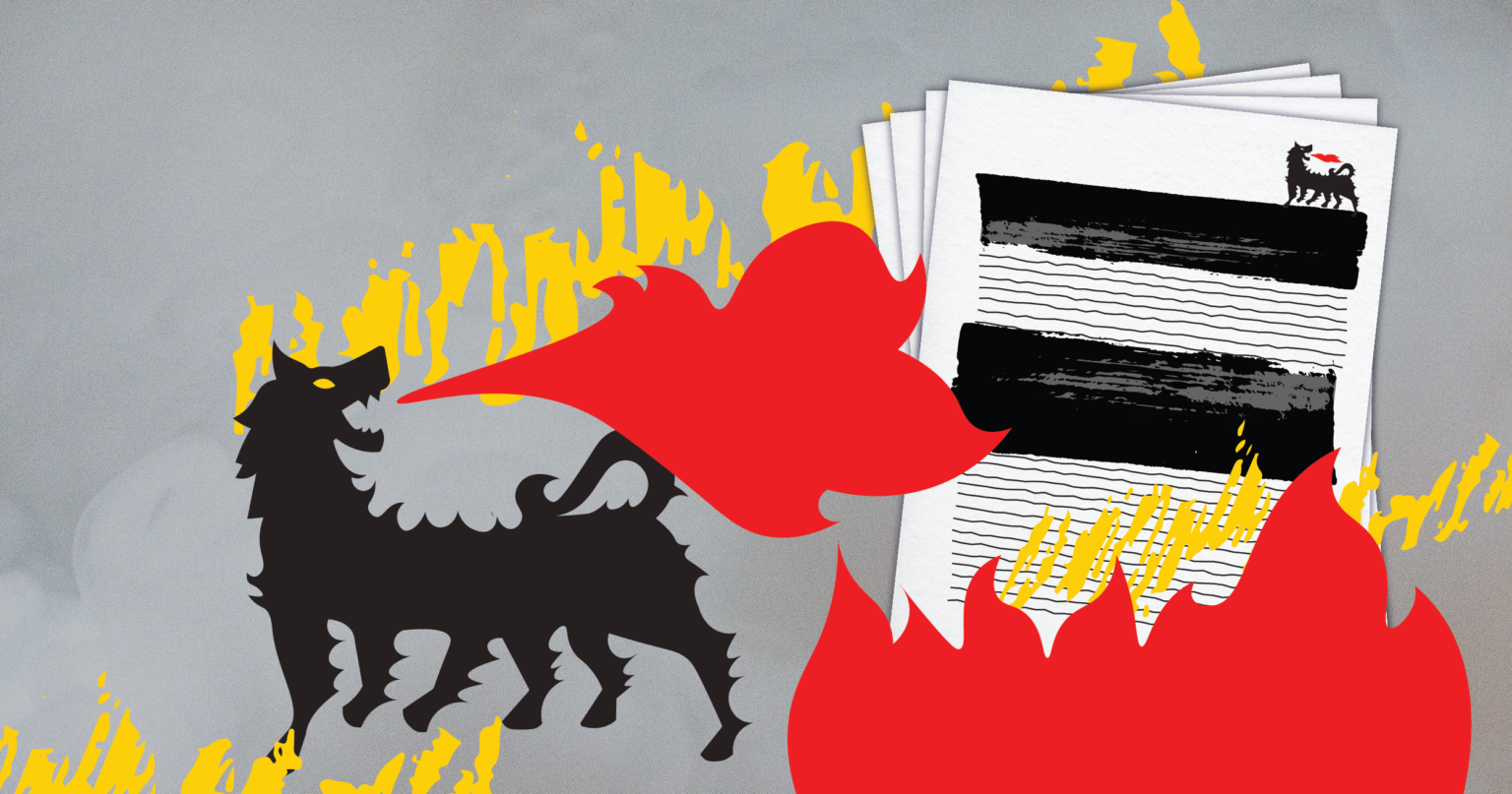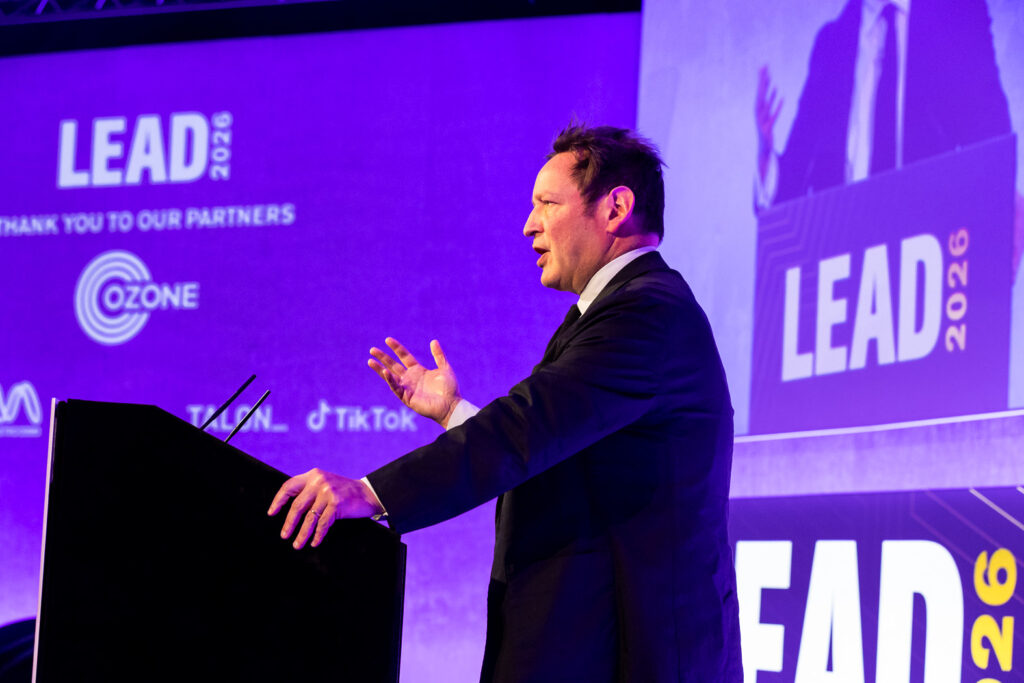This piece is a collaboration between DeSmog and ExxonKnews, a project of the Center for Climate Integrity.
In May, NGOs and citizens sued Italian oil giant Eni for its decades of lobbying and greenwashing to delay climate action. Barely two months later, Eni has laid the groundwork for a lawsuit of its own, alleging it has been harmed by a “massive campaign” of “serious defamatory declarations.”
The move is indicative of a worldwide escalation of a legal tactic intended to cow critics into silence: SLAPPs — or strategic lawsuits against public participation. Enmeshing activists in lengthy legal proceedings can drain their time and resources — a win for the company even if it loses in court.
Greenpeace Italy and Re:Common have alleged in their climate lawsuit — Italy’s first — that despite knowing at least as early as 1970 that burning fossil fuels posed a serious climate risk, Eni went on to promote “natural” –- or methane – gas as a safe energy source for decades.
On July 25, both NGOs received an emailed “request for mediation” from Eni. Under Italian law, a request for mediation is a mandatory prerequisite for filing a defamation lawsuit.
An English translation of the email, which has been reviewed by DeSmog and ExxonKnews, cites posts by Greenpeace Italy and Re:Common on websites and social media, as well as in interviews and statements to the press, that “attributed responsibility to Eni, even of a criminal nature, in relation to the phenomenon of climate change,” as evidence of the “destructive capacity of the damaging messages [on] Eni’s reputation.” Eni also stated that if it eventually sues for defamation, it will seek at least 50,000 euros (about $55,000) in damages from each NGO.
For now, Eni says it is only “express[ing] its concern over the defamatory profiles of the accusations made against the company for alleged ‘climate crimes’,” according to a July 26 statement to Italian media.
“We consider this an attempt to intimidate us,” said Chiara Campione, head of Greenpeace Italy’s Climate Unit. The group has been campaigning to hold Eni accountable for its role in the climate crisis by exposing the company’s advertising in Italian media and television networks and highlighting its funding of Italian university programs — which, says Greenpeace Italy, help to launder Eni’s reputation under the veil of academic and journalistic credibility.
An Eni spokesperson rejected this characterization. “We strongly believe not only that this does not constitute greenwashing but rather it is a serious way to face the energy trilemma: energy security, competitiveness, and decarbonization,” because “demand for gas has remained broadly unchanged over the years,” wrote the representative.
Eni is continuing to produce methane gas while also making “investments in decarbonization technologies [as well as] renewables, circular economy, projects, biofuels, etc.”, the spokesperson stated. (Editor’s Note: Eni invested 15 times more in fossil fuels than in its renewables program last year, according to Oil Change International.)
Eni is not the only oil major retaliating against calls for accountability with a lawsuit.
In April 2023, Total Energies sued Greenpeace France and climate consulting firm Factor-X, claiming that a recent joint report accusing the French oil giant of vastly under-representing its 2019 greenhouse gas emissions contained “false and misleading information.” Total is seeking a judicial ruling that would force the organizations to withdraw their report and all references to it, with a penalty of 2,000 euros (around $2,200) per day for every day the materials remain publicly available.
In the United States, Greenpeace USA faces a lawsuit from pipeline developer Energy Transfer Partners for defamation, trespass, and other allegations related to the group’s involvement in the 2016 protests against the Dakota Access Pipeline near Standing Rock, North Dakota. A five-week trial in the case is scheduled to begin in July 2024.
Human rights and press freedom organizations, international bodies, and courts worldwide have documented the rising legal threat of SLAPPs. A 2021 report by the Business and Human Rights Resource Center found that between January 2015 and May 2021, business actors brought 355 SLAPPs globally against human rights and environmental activists and groups.
Europe has seen an exponential increase in the amount of SLAPPs filed over the past decade — largely claims of defamation — filed by wealthy businesspeople, government officials or leading political parties, and corporations, according to the Coalition Against SLAPPs in Europe (CASE). CASE’s analysis, published last year, recorded 111 SLAPPs in Europe in 2021, as opposed to four in 2010.
The same goes for legal intimidation, which experts say is likely even more common and underreported than SLAPPs. “When aggressive legal threats are used, very often the acts of public participation are shut down even before a lawsuit is initiated and the victims are so fearful that they do not speak about it,” CASE’s report reads.
Eni itself has a lengthy track record of using SLAPPs and other legal threats to intimidate, so much so that in 2021, CASE nominated Eni as its “corporate bully of the year.” While CASE has begun to track the rise of such suits filed by carbon majors in Europe, many go unreported.
SLAPPs don’t always hold up in court, but they can be effective at silencing a company’s critics.
Major campaign groups like Greenpeace are more likely to have the resources to deal with a drawn-out legal process, such as the seven-year fight by Greenpeace USA, Greenpeace International, and other environmental campaigners against a $100 million SLAPP brought by Resolute Forest Products, a Canadian logging company. In April, a U.S. district court in California dismissed Resolute’s case.
It was an expenditure of time and resources that would debilitate many other groups and individuals, according to Charlie Holt, legal counsel at Greenpeace International.
“The most effective SLAPPs tend to be those that target people with very little profile or money,” said Holt, who leads the organization’s anti-SLAPP strategy.
Energy Transfer Partners has also sued an Oglala Lakota and Northern Cheyenne organizer and activist, Krystal Two Bulls, for millions of dollars in damages under RICO — the Racketeering Influenced and Corrupt Organizations Act. Energy Transfer, which hired an international security firm to surveil anti-pipeline protesters, has claimed that Two Bulls was engaged in a conspiracy to oppose the Dakota Access Pipeline.
“In these cases, businesses exploit the power imbalances that exist between companies and human rights defenders, leaning in particular on the substantial financial disparities between the parties, given the costs of fighting such cases in court and the size of the damages often sought,” Mary Lawler, United Nations Special Rapporteur on human rights defenders, told ExxonKnews and DeSmog in an email.
Greenpeace and Re:Common are prepared for these kinds of threats, said Campione. However, she worries that smaller organizations and individual environmental activists “may not have the structure or even access to the resources or legal counseling to counteract this.”
Eni “firmly rejects the allegation that it is trying to intimidate either Greenpeace Italy or Re:Common,” stated the company’s spokesperson. Rather, the request for mediation is intended “to defend its reputation in the face of what we believe are defamatory statements” by the two groups.
The minimum of 100,000 euros in damages mentioned in the request for mediation “is a symbolic rate for Eni,” the spokesperson stated. “If we had opted to sue instead, the potential compensation could have been significantly higher.”
In regards to other legal actions against critics of the company, “Eni has the right and duty to defend its reputation in order to safeguard its shareholders and all the other stakeholders,” the spokesperson stated. “Shouldn’t Eni have the right to defend itself?”
As climate disasters wreak havoc across the world, increasing numbers of climate-vulnerable communities, individuals, and local governments have been taking the corporations most responsible for climate pollution and deception to court. According to a new report by the United Nations Environment Program and Columbia University’s Sabin Center for Climate Change Law, the total number of climate lawsuits has more than doubled in the past five years, from 884 in 2017 to 2,180 in 2022.
But that alone may not totally explain the growing number of SLAPPs. Oil companies could fear that climate lawsuits will subject them to the same kind of public exposure that U.S. tobacco companies faced along the way to a federal court judgment in 2006 for more than half a century of deceiving the public about the health effects of smoking and secondhand smoke. Around 14 million internal tobacco industry documents related to decades of advertising, marketing, political activities, and more are now in a public archive at the University of California, San Francisco.

“This trend is really reflective of the fact that the fossil fuel industry is in its death throes,” said Nikki Reisch, director of the Center for International Environmental Law’s Climate and Energy Program. “Oil and gas companies are increasingly threatened by the challenges that are being brought to their destructive operations.”
Oil giants have even attempted to use laws intended to protect public participation in their own defense. Using anti-SLAPP laws, ExxonMobil has filed a number of unsuccessful motions against some of the U.S. state and local governments suing the company for climate deception, claiming that its own free speech is under threat.
Deepa Padmanabha, deputy general counsel at Greenpeace USA, said it all comes back to corporations twisting the public narrative to shield their own operations from scrutiny. She noted that Energy Transfer Partners originally sued Greenpeace, Two Bulls, and others under criminal racketeering and fraud claims. According to Padmanabha, these lawsuits were intended to villainize protestors and advocates, while deflecting attention away from the potential for the pipeline to contaminate the land and drinking water of local Dakota and Lakota communities. Judges have since dismissed those charges, she said.
“They’re playing off both sides — being plaintiffs and defendants — but the question of accountability unites both,” said Padmanabha. “France, Italy, and the U.S. are all jurisdictions where climate campaigners, local and state governments, have taken Big Oil to court for deceptive climate claims. So it is no surprise that this is where we are seeing these suits attacking speech. Being on the defense with fraud is not what Big Oil wants.”
While the U.S. does not yet have a federal anti-SLAPP law (a bill introduced last year by Rep. Jamie Raskin (D-Md.) failed to advance), several states have statutes that protect against SLAPPs to varying degrees. In Europe, no individual country has yet implemented an anti-SLAPP protection. But a new EU directive, currently in the final stages of negotiation between the European Parliament, European Commission, and European Council, will soon set minimum and legally binding anti-SLAPP standards for all 27 member countries.
“The purpose of any SLAPP is not to win in court, it is to stop the matter being aired in public,” said Justin Borg Barthet, a professor at the University of Aberdeen School of Law, who has advised the European Commission and European Parliament on the introduction of anti-SLAPP legislation. “It is to take a political dispute out of the political arena and place it into an arena in which they have a significant advantage because of their resources.
“What we’re dealing with is the exacerbation of a global threat — not only to the climate but also to the rule of law and to freedom of expression.”
Subscribe to our newsletter
Stay up to date with DeSmog news and alerts






